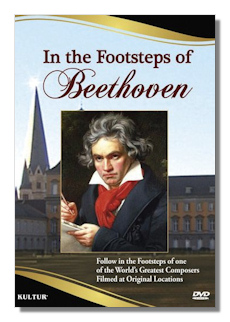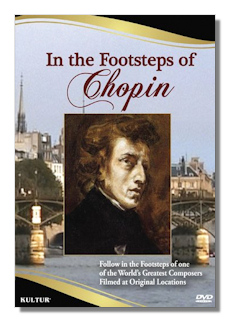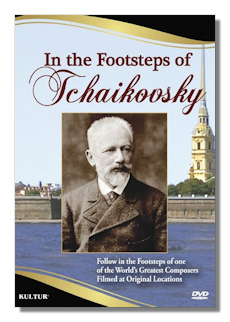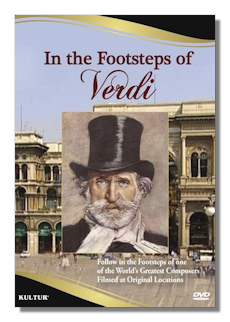
The Internet's Premier Classical Music Source
Related Links
- Latest Reviews
- More Reviews
-
By Composer
-
Collections
DVD & Blu-ray
Books
Concert Reviews
Articles/Interviews
Software
Audio
Search Amazon
Recommended Links
Site News
 DVD Review
DVD Review
In the Footsteps…

Beethoven
Documentary Film Written by Alain Duault and Stéphane Ghez
Directed by Stéphane Ghez
Various excerpts from Beethoven's Works
Kultur DVD D4829 5 m Widescreen Anamorphic Dolby 2.0


Chopin
Documentary Film Written by Alain Duault and Valérie Esposito
Directed by Valérie Esposito
Various excerpts from Chopin's Works
Kultur DVD D4826 49m Fullscreen; Dolby 2.0


Tchaikovsky
Documentary Film Written by Alain Duault and Raynald Mérienne
Directed by Raynald Mérienne
Various excerpts from Tchaikovsky's Works
Kultur DVD D4827 52m Fullscreen; Dolby 2.0


Verdi
Documentary Film Written by Alain Duault and Stéphane Ghez
Directed by Stéphane Ghez
Various excerpts from Verdi's Works
Kultur DVD D4828 52m Fullscreen; Dolby 2.0
The Footsteps series is an educational effort that gives an overview of both the life of the composer under review and the significance of his music. In the case of Chopin special emphasis is paid to his relationship to the culture and people of Poland, where he is revered almost as a god. Of course, the other three composers here are also highly regarded in their respective homelands, and their status and influence there are examined in the films as well.
These videos typically run for forty-nine to fifty-two minutes and thus do not make an attempt at in-depth study or analysis of the composer's music or life. Still, they offer much insight and fascinating information. For example, Verdi, as his admirers surely know, had an obsession with death and fate, but later on in his life he actually developed a strong interest in farming. Beethoven, as many know, possessed a metronome that ran a little fast, and musicologists have conjectured for years that it may well have accounted, at least in part, for his many fast tempo markings. We are also given the two accounts of Tchaikovsky's death: the first is the once commonly accepted story that tells of Tchaikovsky drinking unboiled water at a restaurant during a cholera epidemic and contracting the disease fatally; and the second, a still unproven account, has it that the composer died as a result of drinking unboiled water (or some other lethal liquid) in accordance with a death sentence imposed on him by former classmates at the School of Jurisprudence in St. Petersburg over issues of his homosexuality.
Musicologist André Lischke provides much insight and information on Tchaikovsky and numerous other musicians and musicologists are interviewed or comment on him and his music. The same is true in the other films. Conductor Kurt Masur offers much commentary on Beethoven and is shown conducting the composer's Second Piano Concerto. Karajan begins the film with an excerpt from Beethoven's Fifth Symphony. As you might surmise, each film presents numerous excerpts from the composers' best known scores.
The films thus offer a good sampling of biographical information and choice musical tidbits. Students and those wanting an introduction to the lives and music of these composers will find these four films enjoyable and informative. Naturally, one can quibble about a few things here and there. Some of the pronunciations, for example, are odd, brutally Anglicized or simply wrong: Eroica is mispronounced as "Eroy-ca"; Verdi's first name, Giuseppe, is sometimes spoken with an extra syllable; Klavier is given a French pronunciation; and there are several other questionable pronunciations scattered in the narration of the films. In the Beethoven film a reference is made to the Schiller Ode to Joy and the composer's use of it in the Ninth Symphony, while music from the Waldstein Sonata is played. One could mention a few other missteps as well, but they are hardly egregious or a major drawback to the overall quality of the productions. For the most part then, the films in this ongoing series are generally well made and consistently interesting and educational. If you're hesitant about trying out this kind of fare, let me suggest that you go to YouTube and view excerpts from these videos uploaded by KulturFilms. They should give you a good idea of the quality and style of each of these efforts. Your move.
Copyright © 2012, Robert Cummings




















